Women’s Professional Basketball League (1978-1980)
Tombstone
Born: 1978 – WPBL founding franchise
Folded: September 30, 1980
First Game: December 9, 1978 (L 92-87 vs. Chicago Hustle)
Last Game: March 16, 1980 (L 106-73 vs. Iowa Cornets)
WBL Championships: None
Arena
MECCA Arena
Opened: 1950
Marketing
Team Colors: Lime Green, Purple & White
Ownership
Owners:
- 1978-1979: Robert Peters
- 1979-1980: Herbert Schoenherr, Sr.
- 1980: Dr. Arthur Howell
Our Favorite Stuff
In the early days of the WNBA in the 1990’s, many of the original team names were derivatives of NBA men’s teams in the same city. Charlotte had its Hornets (men) and its Sting (women). In Sacramento, it was the NBA Kings and the WNBA Monarchs.
Twenty years earlier the Milwaukee Does of the Women’s Basketball League tried a similar approach, riffing on the NBA’s Bucks, albeit in infinitely cruder fashion. The team’s logo of a busty, hot-pants clad anthropomorphic Bambi seemed designed for the audience least likely to support a truly professional women’s league.
This Does design is also available in a Women’s V-neck style today from our friends at Cincinnati’s Old School Shirts,
When you make a purchase through an affiliate link like this one, Fun While It Lasted earns a commission at no additional cost to you. Thanks for your support!
Background
Trivia question: where & when was the first women’s professional basketball game played?
Answer: at the MECCA Arena in Milwaukee on December 9th, 1978. The Milwaukee Does hosted the Chicago Hustle in the inaugural game of the Women’s Professional Basketball League. The event drew a crowd of 7,824 curiosity seekers who watched the Hustle hold off a late Does rally to preserve a 92-87 victory. By comparison the Milwaukee Bucks of the NBA drew 8,467 to their first home game at the MECCA ten years earlier.
Although a handful of women had earned paychecks playing for touring All-Star teams such as the All-American Redheads (a sort of female Harlem Globetrotters), the WPBL marked the first effort to establish a nationwide franchised league for women. The league was launched by male investors who spotted an opportunity with the rapid growth of the sport in the 1970’s. The passage of Title IX legislation in 1972 resulted in an explosion of women’s collegiate programs and scholarships. Women’s basketball debuted as an Olympic sport at Montreal just two years earlier in 1976 with the United States taking home the Silver Medal.
Chaos
The euphoria of opening night lasted only four days. General Manager Gene DeLisle fired Head Coach Candace Klinzing after a single game. The quick hook caught the attention of Sports Illustrated, which cheekily pointed out that Klinzing’s bio in the Does’ game program concluded with the admonition “Give ’em hell, Coach. We’re with you all the way.” The Does ultimately went through five coaches during the 1978-79 season. This included DeLisle himself, a man who had never seen a women’s basketball game prior to Does training camp.
Attendance plummeted after the opener. The Does’ woeful play on the court didn’t help. A January 1979 game against the Houston Angels drew only 641 fans to the 10,000-seat MECCA. The two teams combined for 62 turnovers as the Does dropped to a league-worst 1-10. The Does rallied in the season’s second half, but still finished last in their division with an 11-23 record.
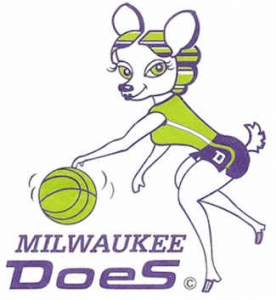 Around the WPBL, teams struggled to attract mainstream media attention. The Does were an exception, attracting consistent coverage from both of Milwaukee’s daily papers, The Journal and The Sentinel. This proved to be both a blessing and a curse.
Around the WPBL, teams struggled to attract mainstream media attention. The Does were an exception, attracting consistent coverage from both of Milwaukee’s daily papers, The Journal and The Sentinel. This proved to be both a blessing and a curse.
Both papers took a keen interest in the front office shenanigans of the Does. They ran exposes of the alleged chauvinistic behavior and misdeeds of the club’s original executives (1978-79 season). They published detailed summaries of the team’s creditors and outstanding balances owed. Original owner Robert Peters rang up debts of nearly $600,000 and was nearly forced into bankruptcy. Miraculously, Peters found a buyer and unloaded the Does to local businessman Herb Schoenherr in September 1979.
Larry Costello Takes Over
Schoenherr settled most of the Does’ outstanding bills and initially established enough credibility to lure in Larry Costello as Head Coach in October 1979. Costello was something of an icon in Milwaukee. Taking the helm of the Bucks expansion team in 1968, he coached the team throughout its Lew Alcindor/Oscar Robertson glory days of the early 1970’s, winning an NBA title in 1971. Costello stayed with the Bucks until 1976 and came to the Does fresh off a one-year stint coaching the Chicago Bulls in 1978-79. Costello was originally hesitant to join the Does. He characterized their first season as “a big mess” in an interview with The Milwaukee Journal, but Schoenherr won him over.
Under the new regime of Schoenherr and Costello, the 1979-80 Does got off to another slow start. By late December 1979, the club was 2-10 and mired in last place. On December 22, the WPBL terminated two under-capitalized expansion clubs, the Philadelphia Fox and the Washington Metros. By virtue of having the WPBL’s worst record, the Does picked first in the dispersal draft of the disbanded clubs. They selected 6′ 2″ center Charlene McWhorter from the Metros.
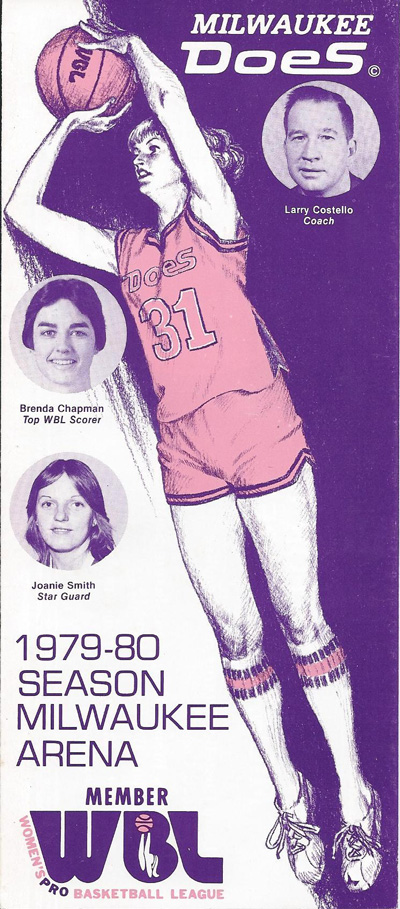
Charlene McWhorter’s Jail Break
The crazy tale of McWhorter’s rookie season epitomized the precarious state of the fledgling league. Originally signed to an $8,000/year contract with Washington, McWhorter never received a dime from the insolvent Metros. Selected by the Does in the dispersal draft, she arrived in Wisconsin just as new Does owner Herb Schoenherr ran out of money himself. Costello and his players stopped receiving paychecks in late 1979 and played the entire month of January 1980 without pay. Meanwhile, McWhorter was selected to play in the WPBL midseason All-Star Game and won M.V.P. honors. Midway through the season, she still had not received a paycheck from either club.
Years later, Karra Porter detailed the rest of McWhorter’s rookie story in her 2006 book Mad Seasons: The Story of the First Women’s Professional Basketball League. Chicago Hustle coach Doug Bruno set his sights on McWhorter, but the Does were not willing to trade their new star. Knowing that Milwaukee wasn’t paying its players, Bruno unilaterally decided McWhorter’s contract was null and void. He simply drove to Milwaukee to pick her up in his van. To save face, the league re-framed Bruno’s jailbreak as a trade. The Hustle tossing a pair of future draft picks to the helpless Does as compensation.
The End
By February 1980, Schoenherr was financially exhausted. He owed tens of thousands in back pay to Costello, his players and the MECCA Arena. A two-game road trip to St. Louis and Los Angeles was cancelled as the team appeared ready to fold. At the 11th hour, a new group led by Milwaukee plastic surgeon Dr. Arthur Howell stepped in with enough cash to finish the season. That commitment did not involve paying Larry Costello, who was asked to continue working without pay and resigned instead. The Does finished in last place once again with a 10-24 record.
In June 1980, during the WPBL’s summer offseason, Howell’s new ownership group re-branded the team. The club would henceforth be known as the Milwaukee Express. A new maroon and silver logo replaced the Does’ busty-deer-in-hot-pants motif. Meanwhile, the rest of the WPBL continued to face a severe crisis of confidence. League directors set a deadline of September 30th, 1980 for each club to post a performance bond of $150,000 for the 1980-81 season. When the deadline arrived, four clubs chose not to move forward, including the Express. The turning point for owner Arthur Howell was reportedly the pessimistic results of a local market survey commissioned as part of the team’s re-branding efforts.
The Does/Express formally shutdown on September 30th, 1980 along with the Houston Angels, Iowa Cornets and New York Stars.
The WPBL played its final championship game in April 1981 and they quietly disbanded.
Milwaukee Does Shop
Editor's Pick
mad seasons
The Story of the First Women’s Professional Basketball League, 1978-1981
by Karra Porter
When you make a purchase through an affiliate link like this one, Fun While It Lasted earns a commission at no additional cost to you. Thanks for your support!
In Memoriam
Former Does and Bucks Coach Larry Costello passed away in 2001 at age 70. New York Times obituary.
Downloads
4-2-1979 Does vs. Chicago Hustle Game Notes
4-2-1979 Milwaukee Does vs Chicago Hustle Game Notes
1979-80 Milwaukee Does Season Ticket Brochure
1978-79 Women’s Professional Basketball League Brochure
Links
###

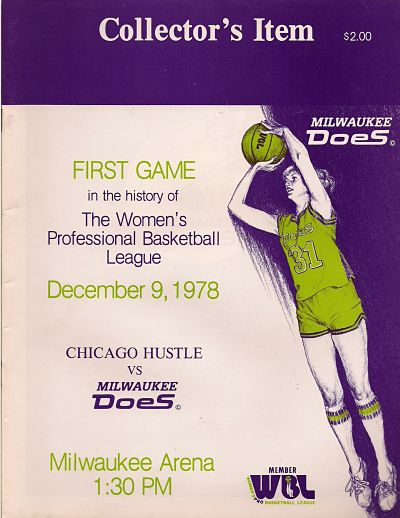
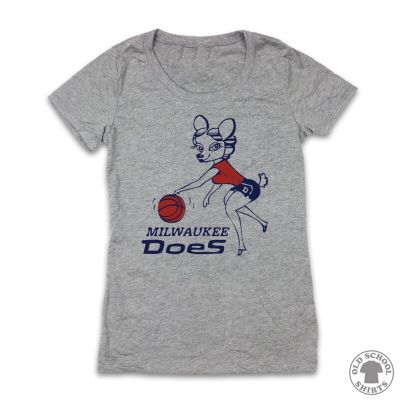
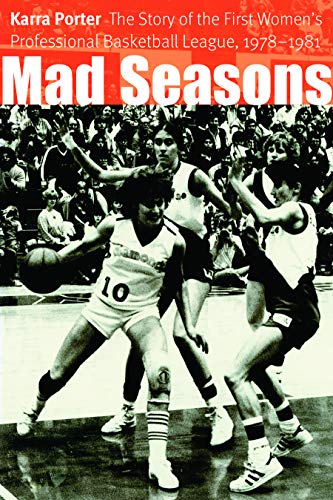

3 Responses
When was the first women’s professional basketball game played? Milwaukee MECCA Arena – http://t.co/kG9sesqJ
Can u get old tee shirts or hats from the old Milwaukee Does teams
You might find a vintage one on e-Bay once in a blue moon. I am not aware of anybody who has made throwback T’s for any of the old WBL teams.
Drew